#musical literary analysis
Text
emma is the villain of tgwdlm
I need to talk about this oh my god
because it's told from the hive's perspective. paul is the protagonist because he is the one who resists them but must ultimately come to accept that they're right. emma is the one who must be beaten through force.
the difference between the hero and the villain is that the hero must change, while the villain cannot. (I'm not speaking in universals here, just generalizations of how the narrative structures work that tgwdlm uses in parody.) the hero and the villain both hold a belief that represents the thematic evil; by the end of the story, the hero must undergo apotheosis, which is to say, ultimate unity with the thematic good. once this is achieved, he can defeat the villain, who represents the thematic evil completely and is incapable of change.
to the hive, "good" is unquestioning conformity to the group's ideals, specifically, singing and dancing in sync with everybody else. "evil" is refusing to sing and dance along when, clearly, you want to.
paul is the perfect protagonist because he resists song and dance, but largely because it makes him uncomfortable. getting out of your comfort zone is necessary for change! it's a good thing to let yourself go through something uncomfortable in order to come out the other side better and stronger for it. (that much is true; however, sometimes discomfort is a legitimate sign that you should stay away from something.) paul has never really tried singing or dancing, and deep down, is afraid that if he tried it, he might like it. exactly the sort of person who can be converted and used as a shining example of the hive's righteousness.
emma must be the villain because her refusal to fall in line is a choice. she can sing, she can dance, she was in brigadoon in high school and she fuckin killed it, she is even taught a whole ass song with choreography by the hive on their first morning in hatchetfield (emma's comment about how they have to sing "all the time, apparently!" and zoey's implied presence at the theater when the meteor hit - because she was with sam, and sam was there - strongly suggests that nora and zoey were zombified all morning and she had no idea). it's stated by hidgens and suggested by nora and zoey that getting a human to sing/dance along with them is supposed to be a sort of mesmerizing tactic that the hive uses to start synchronizing a person to the hive mind, but emma refuses. she sings and she dances, just like they want, but she chooses to actively hate it the whole time, on principle. she can't be convinced; they have to swarm her, surround her on all sides. let it out is meant to win paul to their side; inevitable is just to gloat.
in the bar scene in hidgens' bunker, emma says that she must be the villain to paul's hero because she was in the musical that got him to hate musicals. on the one hand, she had it backwards; she's the villain because according to the hive, the all-encompassing narrative power, he's not supposed to hate musicals. on the other hand, she's kind of right: paul is the protagonist because he is the guy who didn't like musicals, while emma is the villain because she has the capacity to like musicals as well as experience in them, but has chosen to reject them.
who is the hero and who is the villain all depends on who is telling the story. and the hive is telling this story. don't forget that.
#starkid#team starkid#the guy who didn't like musicals#tgwdlm#media analysis#literary analysis#hero's journey#tgwdlm emma#tgwdlm paul#emma perkins#paul matthews#lauren lopez#jon matteson#nick lang#matt lang#jeff blim
309 notes
·
View notes
Text
it's immediately clear that both the creature and victor find some of their greatest comforts in nature and that's one of the key features that connects them and proves they're not so different from each other, but i've also noticed that they tend to admire different TYPES of nature
victor tends to amaze at "the high and snowy mountains [...] immense glaciers [...] the rumbling thunder of the falling avalanche [...] the supreme and magnificent mont blonc" (65), typically finding the most comfort in the "savage and enduring scenes" (64) which tend to be colder and rougher yet unchanging; while the creature found that his "chief delights were the sight of the flowers, the birds, and all the gay apparel of summer" (94). there is probably something to be said about the creature's affinity for spring and summer, the seasons of rebirth, of NATURAL and beautiful life, a direct contrast to his unnatural, coldly scientific, "wretched" rebirth that he abhors so much
i was discussing this idea with a friend, who added that victor finding solace in the frozen and dead beauty of wintery environments, a typically less-favoured season, could reflect how victor often refuses himself the typical joys of life. throughout the novel, he struggles with his self-worth because of the guilt induced by his creation of the creature and the deaths that then followed, and the only reason he even desires peace and comfort is because he knows he needs to present himself that way to his family in order for them to be happy ("i [...] wished that peace would revisit my mind only that i might afford them consolation and happiness" [62]). i built on her idea by noting how the creature acknowledged that he "required kindness and sympathy; but [he] did not believe [him]self unworthy of it" (94), a completely contrasting stance from victor, who finds himself undeserving of the many comforts offered to him by his family
furthermore, it seems that victor finds beauty in glory & majesty ("[the scenery] spoke of a power mighty as Omnipotence--and i ceased to fear, or to bend before any being less almighty than that which had created and ruled the elements" [64]), while the creature finds beauty in warmth & growth. both characters seem to find what they desire(d) in the versions of the natural world that they admire most
to reference what i said in the beginning about the connections between victor and the creature, this observation only contributes to my understanding that victor and the creature are incredibly similar, and many of their identical traits involve a rejection or a reversal of the other; they both ardently wish for each other's destruction, they both ruined each other, they're the reason that the other is simultaneously a victim and a villain in their own sense, they both hate themselves but for reversed reasons (victor hates himself for what he's done rather than what he is, while the creature hates himself for what he is more than what he's done), and now this--they both find solace in nature, just opposing kinds. like father, like son
#if any of my friends see this#hiii#my apologies if i missed something crucial#i hope this makes sense. maybe it doesn't#maybe i didn't make any points at all! or maybe this is already well-known information#frankenstein#frankenstein the modern prometheus#mary shelley#mary shelly's frankenstein#classic lit#classic literature#gothic lit#gothic literature#frankenstein a new musical#literary analysis#victor frankenstein#frankenstein's monster#frankenstein's creature#adam frankenstein
498 notes
·
View notes
Text
many thoughts about epic: the musical...
i am once again in the middle of essay writing but plautus is boring and my friend introduced me to this album so u already know I binged the entire thing
(quick warning for spoilers of homer's odyssey? if that's necessary?? man idk whatever)
first thoughts naturally concerned odysseus. i have hated this man with a burning passion ever since I started studying classics - i think he is irredeemably selfish, a liar masquerading as a 'resourceful hero,' and basically just a twat all around. that being said, i respect that epic is not an exact replica. in fact, i like that about it!
readings of odysseus as a loving husband and father, and a man who cares deeply for his crew and fellow warriors is one i would love to see reflected in the source text (though i admit i have only read two different translations so far, so this is subject to change depending on translators choice!), if only because it would be so so refreshing. and epic does that extremely well! i find epic's odysseus to be far more likeable, insofar as he is fueled not by greed for glory (kleos for the nerds out there) but rather the desire to return to his wife and son. (I personally would argue that, while homer's odysseus is indeed fueled by a desire for homecoming (nostos), it is not for the sake of penelope and telemachus, but rather concern over the security of his status and position within the household (oikos))
i also very much enjoy that the love he holds for his family is not an inherently positive trait. in the aeneid, and often in myth, it is achilles' son, neoptolemus/pyrrhus who kills the son of hector and andromache, astyanax by throwing him from the walls of troy - less common, it is odysseus (which i did not know until i googled it just now oops). homer's odysseus does not reject the gods. he is beloved by some, hated by others - he receives their boons and curses as they come. he revels in the attention of the divine, no matter positive or negative, for it is proof of his kleos. epic's odysseus is so much more... human. he doesn't vie for glory that reaches the skies. if anything, he rues it. in the horse and the infant he supplicates himself to (who i assume is) zeus - which is such a loaded act i am genuinely struggling to think of how to articulate it, but boy am I gonna try my darndest.
the act of supplication and guest-friendship (xenia) is a very key theme within the odyssey, and to a point in the iliad also - essentially, if a traveller were to arrive at your doorstep, you were obliged to let them in and provide food, drink, and lodgings to that traveller, no questions asked. in return (because reciprocity is VERY important in homer especially), the guest would provide entertainment, tales of their travels, etc, and would be respectful of their host. the patron of these travellers was zeus. any violation of these terms, on part of the guest or host, would be met with divine scorn. for odysseus to supplicate himself to zeus is therefore meta as hell, but I would instead bring attention to the echoing lyric "hes bringing you down to your knees." 'he,' assumedly, is astyanax. his father, hector, is dead; as is his grandfather, priam, and all of priam's other sons. at this point, one could assume that it is astyanax who is ruling troy, who is now the host of the city that odysseus, a traveller from another land, has entered and ransacked. zeus' 'prophecy' of astyanax growing old and seeking revenge (reciprocity! homeric greece had a 'revenge culture' - essentially 'an eye for an eye' as well as 'you scratch my back, I'll scratch yours,' though not always so clear-cut), therefore, would be odysseus' punishment for violating the terms of xenia.
supplication, however, is not limited to guest-friendship alone. for example, in odyssey 22, when odysseus slaughters the suitors occupying his home (is that spoilers?), their priest leodes supplicates himself at odysseus' feet, begging to be spared. odysseus takes his head from his neck in an instant. odysseus' kneeling before astyanax, therefore, is no simple act between a guest and his host - perhaps he is begging the infant for mercy, for forgiveness, or perhaps he is positioning himself for punishment; in killing astyanax, odysseus accepts his own death. perhaps this means his fate (which, in case of homeric epic, refers to the time and manner of one's death), or perhaps it is a part of him that has died. in just a man, odysseus asks "when does a man become a monster?" his killing astyanax prevents the boy from ever becoming a man, and spares him from a life fueled only by revenge and the need to regain his glorious birthright, and it turns him into a monster. just as he says he would, he trades in the world where he is 'just a man' for a world where he is a cruel beast, all for sake of his family.
(quick detour but i really like how odysseus' focus is primarily on penelope rather than telemachus. [insert deadbeat dad joke here], but in reality, he doesn't even know the boy. penelope he chose to marry and fall in love with - it's no question that he loves telemachus, but after ten years, it is only natural that he would miss his beautiful, tricky wife with more fervour than the child he never had the chance to love. it shows he is imperfect, even illogical - the son is the father's entire legacy. just as odysseus is 'son of laertes', so will telemachus be 'son of odysseus', the protector of his immortal heroic legacy. yet it is penelope whom odysseus yearns for.)
(another detour but "i'm just a man" is such a juicy lyric, because the entire message of homer's odyssey is that odysseus is not any man - he is a man that the muses deem worthy to inspire great poets to compose epic poems that persist through thousands of years and a million different voices - a hero. but epic's odysseus is not that hero. he is a man, trying to go home, craving comfort and the warmth of the hearth. these 'flaws' humanise him more than homer's odysseus could ever imagine.)
skipping over to polyphemus, odysseus violates xenia once again by killing polyphemus' sheep, albeit unwittingly. homer makes this violation very obvious - odysseus and crew eat polyphemus' cheese and wine while polyphemus tends to his sheep, knowing that the cave is obviously inhabited, and they even wait for polyphemus to return to ask for more. it is worth noting as well that, at this point, odysseus and crew are still jubilant about their victory, and unlike in epic, these 'detours' are purposeful, specifically so that odysseus can scope out the islands for anything of interest he can snatch and add to his spoils of war, adding to his kleos by means of physical wealth (timē) - which makes odysseus' offer of treasure to appease polyphemus all the more baffling in epic. this odysseus is a leader who prioritises the lives of his men over his own kleos, which makes the final lines - "you shall be the final man to die" // "what?" // "watch out!" - all the more heartbreaking. he wants to protect his men, so that they too may return to their families back on ithaca; the prospect of watching them die before his eyes after he already witnessed so many lose their lives in battle must be so utterly terrifying.
polyphemus is so excellently creepy as well! i loved him in the odyssey - this was where I really started to dislike odysseus, actually. he's a cyclops, obviously inhuman, yet he rears sheep and makes cheese and wine and weaves wicker baskets to keep them in, trying to play at humanity. i really did sympathise with him from the first time I read it. epic's polyphemus is similar, so very calm in his anger yet ruthless all the same, and demonstrates great restraint in comparison to his counterpart in the odyssey, who gets filthy drunk after mashing six men dead and allows odysseus+co. to fashion a stake with which to blind him. much of the violence against polyphemus, as well as the violation of xenia in homer's odyssey is 'excused' by the fact that polyphemus is a 'barbarian', to whom concepts of civilised people do not belong.
(very quick detour but polyphemus' first admonishment of odysseus - "you killed my sheep" up to "take from you like you took from me" - makes such heartbreaking parallels to astyanax's murder and the sack of troy. it almost provides a visualisation of the guilt that odysseus must still be battling. i would have loved to have been in his brain when he heard polyphemus say that.)
the mercy odysseus shows polyphemus is particularly interesting - homer's odysseus leaves him alive and tells him his name purely so that his name will spread and his kleos will grow. but epic's odysseus, despite his conviction to kill in survive and to avenge is fallen comrades in remember them, spares him. in part, this is to assure them an escape, so that the cyclops' giant body does not block their exit - but athena's interruption makes clear that this is not all. she criticises him, remarks "he is still a threat until he's dead." no doubt this calls back to zeus' warnings about astyanax, hence his refusal (or inability?) to commit to slaughter. for a homeric greek hero to allow a foe to live on after his allies had been slaughtered is a grave failure of reciprocity, casting shame on both the hero and their enemy. homer's odysseus escapes this with his reputation intact, since as a result polyphemus curses him to face poseidon's wrath - as I mentioned, for a hero, even negative attention from the gods is a good thing as it proves that their reputation/glory is known all over, even in olympus. but, as we have established, epic's odysseus cares not for kleos. the decision to tell polyphemus his name is entirely impulsive and irrational, grieving his comrades, hence athena's outrage.
the relationship between athena and odysseus is founded entirely on the principles they share, described in warrior of the mind (if anyone can lmk whereabouts this song fits in the timeline I will be so grateful, I'm stupid unfortunately :/). they value wisdom, reason, and rationality over brute strength and bloodlust. epic's athena becomes odysseus' patron goddess with the goal to "make a greater tomorrow" and "change the world" - aspirations that are entirely foreign to any homeric god. gods in homer do not care about the wellbeing of humans unless they are directly related to them, and they certainly don't care about the wellness of humanity as a whole. humans are toys and tools of the gods. the amount that athena cares for odysseus, even in the odyssey, is unusual, demonstrative of how much she cares for him, yet epic makes their comradery more obvious, even going as far as to (tentatively) call them friends. my goodbye frames athena's anger as disappointment at an experiment failed - calling back to warrior of the mind, where she claims to have "designed" him - but odysseus' replies to her makes clear that it is far more personal. perhaps, to her, odysseus acting so irrationally is even a betrayal; odysseus is abandoning the principles of reason they both once held and thus is forsaking all that they once shared and that she, as the goddess of wisdom, stands for.
ive always considered athena to be a very interesting goddess. she is a patron of both war, which in homer is only carried out by men, and weaving, the traditional work of women within the household - her very nature is a contradiction of masculine and feminine. although it is ares who is considered the 'black sheep' of the olympians for his brutality in war, epic's portrayal of athena through odysseus' lens paints her as lonely and ostracised - "since you claim you're so much wiser // why's your life spent all alone? // you're alone." It is clear that odysseus here does not view her as his patron at all, rather as a friend - and to that she takes offence, because she is a goddess, eternal and all-powerful. she does not need friendship or comradery; those are mortal concerns alone. personally, I see epic's athena as incredibly insecure. she cuts odysseus off because she cannot bare that a mortal has been able to read her so clearly, to see all the ugly parts of herself that she keeps hidden to retain the facade of the perfect goddess. she knows the paradox within herself - warrior and woman, immortal and alone - and rues that odysseus was able to see it as well. the cruellest part, the most ironic, is that his being able to figure out the true, imperfect nature of a god shows that he has not abandoned the path of the warrior of the mind. in fact, his wisdom extends beyond mortality into the realm of the divine. but athena is blinded by her anger and insecurity, and she says her goodbyes. she disappears from there, only to appear again to try to warn odysseus of his crew opening the bag of winds given to him by aeolus in keep your friends close, once again demonstrating her care for him, despite her anger.
the amount that odysseus cares for his crew is demonstrated time and again throughout the album, yet in the end, he still slowly loses their trust. aeolus' winds are the first sign. his crew betrays his orders upon the first whisper on the wind that he might be keeping treasure from them. the next sign, in puppeteer, is eurylochus' confession upon arrival to aeaea (circe's island), which odysseus brushes off, much as he brushed off eurylochus' concerns in luck runs out. then, in a matter of moments, 600 men are reduced to forty by the wrath of poseidon - which in itself is a significant change. while odysseus in epic is explicitly blamed for failing to kill polyphemus, homer's odysseus takes no responsibility for the deaths of hundreds of his men. it happens when they arrive at telepylos, which, unbeknownst to them, is home to the laestrygonians, a race of cannibalistic giants. odysseus, apparently sensing something off (who tf does he think he is, spiderman?), allows his entire fleet to enter the bay of telepylos while his ship alone remains outside - and when those ships are attacked and trapped, he alone takes his single ship and escapes, allowing twelve ships of men to be ripped apart and eaten by cannibals. an act which he shows no remorse for.
in my interpretation of homer's odyssey, it is this slowly slipping trust that eventually leads to his men ignoring his warnings and feasting on the cows of helios which leads to the deaths of all his remaining crew, including eurylochus and polites (spoilers? idk). so, once epic: the musical catches up to book 12 of the odyssey you WILL be seeing me again I hope ur excited.
there is definitely more i could say here, especially about the circe saga bcs ohhh my god I love circe and I love this circe especially (a female character with actual motive other than being a victim? homer could never) but unfortunately I'm running out of steam and I do in fact have 3 essays due this month (help) so I will probably return to this later !! hopefully its readable bcs I'm not going back to edit any of this ;)
#joined cort's spotify jam while writing this and got rickrolled#the message here is trust no one#skipped my seminar to do work and did this instead#fuck u plautus and your dumb menaechmi#this took like 4 hrs to write i have issues#epic the musical#epic the ocean saga#epic the circe saga#epic the cyclops saga#epic the troy saga#epic#classics#classical studies#homer's iliad#homer's odyssey#the odyssey#odysseus#penelope#media analysis#literary analysis#longpost#homer
83 notes
·
View notes
Text
Galinda's True Colours
One key theme in Wicked is superficiality. The world of Oz is a place where honest conversation is difficult to come by. Almost everyone is pretending to be something, or believe something, or have something, all to get what they want.
Popular approaches this theme with the subtlety of a hyperactive wrecking ball and gives a musical monologue about how this world works, and why.
Because Galinda has been portrayed as ditsy up to this point, with a bit of the self-serving schemer archetype thrown in for flavour. But here, we see just how intelligent she is. Galinda has caught on to how the world works, and understands what buttons to push.
Let me explain.
SPOILERS AHEAD (Wicked)
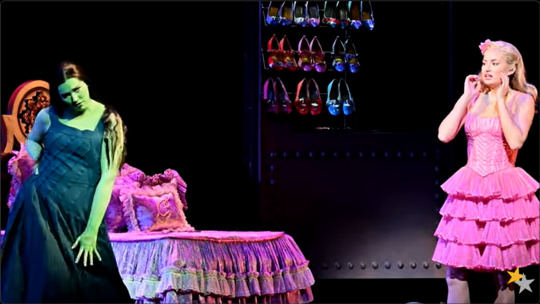
The first element to be brought under examination is Wicked's love for subverting expectations. By this, I mean that certain mindsets in the world have stereotypes associated with them, take idealism and cynicism for example.

From what I have observed, when a writer wants to use one of these archetypes, they will probably draw on a few common ideas. The former is usually portrayed as stary-eyed and naive, or unflinchingly positive. Cynicism meanwhile has a certain sarcasm to it. A cynic might feature a permanent scowl and a dry remark as a kneejerk reaction to anything.
In short, Cynics are usually written to be villains who are overcome by hopeful heroes, or to be heroes who are proven right by a world where hope is meaningless. Idealists on the other hand are either heroes who make the world a better place by sheer force of goodness, or naive fools who the world breaks down.

Obviously, there are exceptions to the rule, but those exceptions are mostly more developed characters in their own right, so the label of "a cynic" doesn't really fit them. Batman is an idealist (when he's written properly).
What is fascinating about Wicked is how the characters are presented. Elphaba is introduced as cynical, she fits the archetype to a tea. But after a musical number, her character swaps entirely. She keeps the sarcasm, but the hopefulness becomes a driving force that goes against the stereotype.
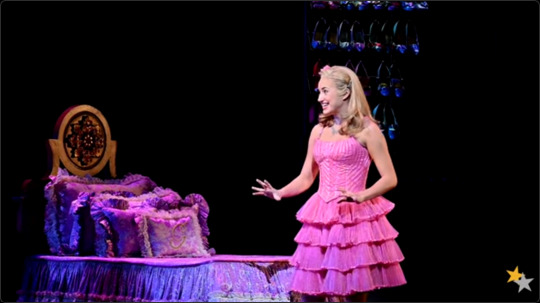
Galinda is... introduced as a bit of a ditz. She's got an ego, she gets what she wants all of the time, she has a well-known family. She's the generic rich kid, essentially. Fiyero gets the same treatment.
For the record, By Galinda, I mean young Glinda, and I am treating them as separate entities until they meet back up.
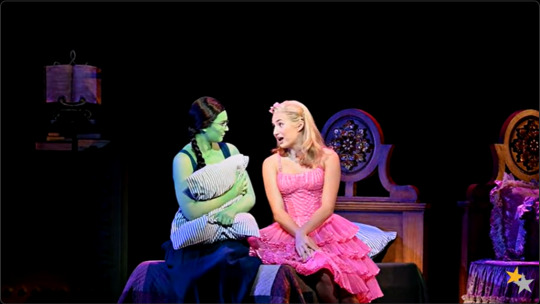
Anyway, when Galinda starts singing, her real worldview becomes clear. It's possible to argue that it wasn't particularly hidden to begin with, but in Popular, she bludgeons you over the head with it.
"Celebrated heads of state
Or 'specially great communicators
Did they have brains or knowledge?
Don't make me laugh!
They were popular!
Please, it's all about popular!
It's not about aptitude
It's the way you're viewed"
As much as I despise it, Galinda is kinda right here.

In 1964, Henry Littlefield published an essay in the American Quarterly titled The Wizard of Oz: Parable on Populism in which he gave some opinions on a theoretical metaphor inherent in The Wonderful Wizard of Oz book (if you don't want to read it, TedEd has a video discussing it and its legacy). He claimed that it was an inherently political book about the time Baum wrote it.
The sparkly new world looks even better if you put on tinted glasses, and only works if you understand that the wizard's power is empty, so Littlefield proposed.
Scholars since have praised, debated, and debunked Littlefield's essay. Pointing out the fact that this is pattern recognition with hindsight, in the same way that you can look to the stars and see a goat.
Essentially, there is an argument for The Wonderful Wizard of Oz being political, and there is an argument (most famously made by its Baum himself) that it is just a children's book.
Wicked is a satire, and not a children's book, so it gets away with some heavy insinuation, but to avoid landmines and a lack of knowledge on my own part, I am going to talk exclusively about how this affects the land of Oz itself, rather than its implications for the real world. Please don't argue in the replies.
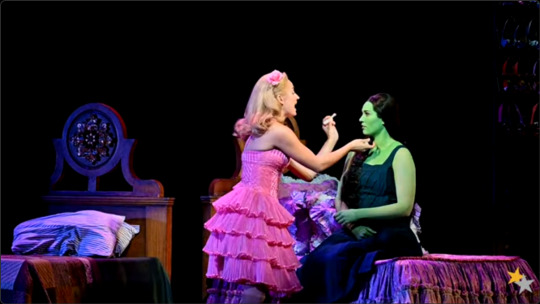
So, Galinda's hypothesis here is that the leaders of Oz do not get to where they are because of any actual skill, but rather because they were well liked by either the people, or their superiors. She gets proven right about this throughout the musical. Madam Morrible moves up in the world by presenting Elphaba to the wizard, the Wizard gained power by giving Oz a common enemy, and Galinda and Fiyero themselves gain status seemingly out of nowhere.
In Oz, it doesn't matter what you know, but who you know, and who knows you.
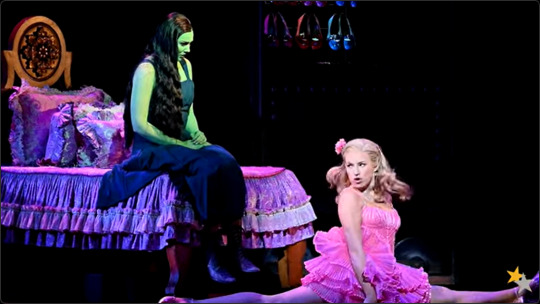
In the show that I watched, Galinda was played by Courtney Monsma, who knocked this number out of the park. Galinda is an incredibly cynical character, but Monsma played her with what I can only describe as "manic pixie energy", which circles back to Wicked's idea of superficiality.
Because the ditzy pantomime of Galinda present in What is this Feeling and half of Dancing Through Life is nothing compared to the madness that is Popular. This is a character who knows exactly how to toss her hair to get what she wants, who knows how to make people think she is something she isn't.
Monsma played a character who was well aware that perception would get her further in life than intelligence, and was having fun with that confidence. But she is actually clever, Galinda has picked up on this fact that everyone else has just accepted subconciously, but now she can explain it.
This song feels like a hyper fixation rant. The frantic obsession was a mere outlet for the excitement of finally being able to speak to this worldview head on to someone who she respects and knows will actually understand her. This song feels like Galinda and Elphaba are on emotional and intellectual equal footing.
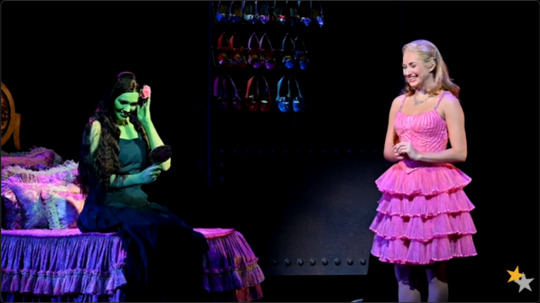
This song is also part of my case for Wicked as a queer musical that only works as a story because the romance doesn't. As in, this is a story about a romance that could have been, and that romance reads as queer to me. I will get more into it next week, but for now, I will say this:
This song doesn't matter, and that's exactly why it does matter.
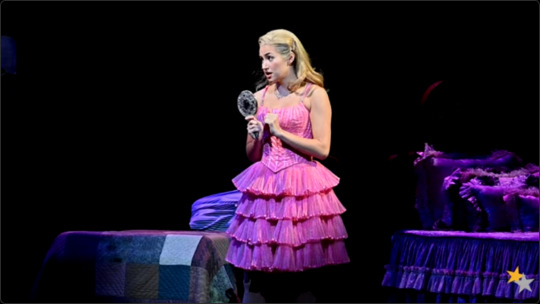
This is the moment when Elphaba and Galinda connect, and share. This is Galinda trying to give back for the wand and make up for her previous behaviour to make Elphaba less of an outcast. But she has already done that.
The moment at the end of Dancing Through Life when Elphaba and Galinda share the spotlight, when Galinda makes herself look like a fool to match Elphaba, when she lets the outcast lead, and the rest of the room goes along with it. That moment is when the romance is kicked off, that is the moment when she starts making amends. That is the moment when she starts to make Elphaba less of a social pariah.
That dance renders Popular superfluous, or at least it does on paper. In reality, this song is doing a lot of heavy lifting in the foreshadowing department, even more so than What is this Feeling, in my most humble of opinions.

Popular happens because Galinda is right about so much in her world, but wrong about the most important thing. Brains and knowledge are irrelevant in Oz, perception is powerful, but empathy rules them all.
Galinda gives this big show of how amazing she is for helping people. Look at her, she's so good. But, Elphaba doesn't care about that, and Galinda does. The romance doesn't work in the end because Galinda realises too late that in the big scheme of things, superficiality is nowhere near as fulfilling as connection. That's why her romance with Fiyero breaks off, and its why her romance with Elphaba is doomed. She only realises this when both options are off the table.
The romance between Elphaba and Galinda breaks apart, but it can only do that because it was there to begin with. You can't tear down nothing.
You could read the relationship as entirely platonic, a friendship that breaks down. But art is subjective, and to me, the romance makes this story so much more compelling.
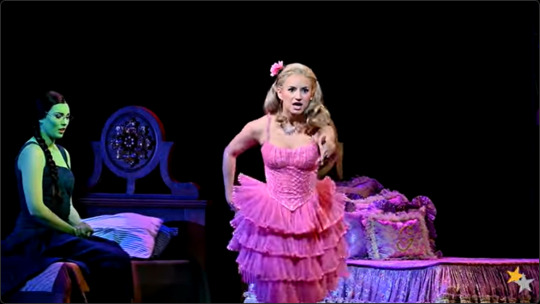
Final Thoughts
Popular is a popular song in the fanbase. It's an absolute bop, but it's also one of the simplest numbers in the entire production. The set is two beds, there is no fancy dancing, just one character sitting still and the other jumping around like she's on springs. The set doesn't change, there are no extra characters, nothing.
This song doesn't let anything distract from the character drama that is going on in centre stage, so that the audience can take in what is actually being said and done.
Next week, I am taking a look at I'm Not That Girl, and I will being going all in on the queer reading of this musical. Although, that is a heterosexual love song, right? How could that be queer? I have thoughts, so stick around if that interests you.
Previous - Next
(Images were sourced from this video)
#rants#literary analysis#literature analysis#character analysis#wicked is a queer story#wicked the musical#glinda upland#elphaba thropp#wicked musical#musical analysis#lgbtq#queer coding#lgbtqia#queer#gelphie
86 notes
·
View notes
Text
ok so what I kind of alluded to in this post the other day
like choices were made with bbc!Javert that's for sure but also he is not unrecognizable
from the beginning, they decided that Javert would have power. He was not just helping in Toulon, he was the guy there. He had no one to answer to, he had no superiors there. He followed the law and the rules of Toulon, cruelly and coldheartedly.
And so they established his character to be like this. Then he became a policeman and got promoted to an inspector and assigned to Montreuil. We were supposed to see him working under Madeleine, but they decided that bbc!Javert would recognize him immediately - there was zero doubt in his mind.
"Good God! it is very easy to be kind; the difficulty lies in being just. Come! if you had been what I thought you, I should not have been kind to you, not I! You would have seen!" (Hapgood)
(the translation I'm reading is using "good" (because the French is using "bon") and not "kind", but I think it doesn't matter much)
So bbc!Javert had no reason to act extremely respectfully and deferentially (in some way, he acted as Javert in the book before Madeleine became the mayor, but bbc!Javert was more forward and open about it. We only got very little from that period in the book; and the most we got was him provoking Madeleine during the cart scene).
And because bbc!Javert always knew, his character needed to be kept consistent and so his characterization would be mainly taken from Fantine's arrest and Valjean's arrest.
Javert doesn't listen to people he deems to be criminals. He doesn't care. Any protestation will make him angry, he will raise his voice. Javert enjoys power and hates when his authority is mocked and threatened.
During Valjean's arrest, Javert is petty, he literally stomps his foot, he even grasps Valjean's coat, cravat and shirt. He is elated, cruel, and uncaring.
“I tell you that there is no Monsieur Madeleine and that there is no Monsieur le Maire. There is a thief, a brigand, a convict named Jean Valjean! And I have him in my grasp! That’s what there is!” (Hapgood)
During the Montreuil era, bbc!Javert is a version of book!Javert that excluded the presence of a superior Javert would respect, i.e. Madeleine, imho. There was only a thief and a criminal present for bbc!Javert, and so he behaved accordingly.
#do i have issues with him in paris? sure especially in episode 5. but that just stems from 'my expectations'#the adaptation is being consistent with him and it works for me#it's still very lolwhut man? tho lol#and sure i could be wrong and biased#but i'm posting on tumblr and not writing a literary analysis lol#i just like this adaptation and want to talk about it 🙃 and have fun with a character#also my impression might be different because i watched the series dubbed#les miserables bbc#les miserables#javert#wish i could be normal and just like the book or the musical the most lol
21 notes
·
View notes
Text
A lot of my favorite books are those that make me think, not necessarily those I agree with.
I disagree with Sallust's reactionary, sometimes sexist views on society, but I found some brilliant subtext and double meanings (intentional or not) in his Bellum Catilinae. I'm no Stoic, but it was fascinating to read Epictetus and consider what I agreed with (the anti-anxiety suggestions) and what I didn't (I think he's too dismissive of the possibility of social reform). The writers forced me to weigh what I was reading carefully, and make up my own mind.
I like to think that everyone has something to teach me, if I can keep an open mind. It might not be what the person would intend me to learn: Catholic school made me very not-Catholic. But it also forced me to think carefully about why I disagreed, and to see the difference between the religion's official doctrine, and its individuals, who can be as good or bad as any other group of people. You can't know someone's character based off just a label. The world is big and complicated, and each of us is only seeing a small part of it.
I like books that help me see into another person's part.
#i also gotta shout-out the analects of confucius here. i disagreed with a lot but still think about some of his ideas years later#and his sheer enthusiasm for art music and learning touched my heart#jlrrt essays#literary analysis#sallust#bellum catilinae#epictetus#empathy
16 notes
·
View notes
Text
I saw some people critiqueing Hozier's Too Sweet for "the quality of the lyrics being low", being too "mainstream", too "pop".
I don't know if I want to laugh or despair. Like obviously nobody is obligated to like a song, but sneering that the lyrics are too "popsongy" is just such an unfair, dumb take to me.
This song is exactly the sort of song that would be perfect for teaching literary/lyric/art analysis because it's so much deeper than it appears to be when you first hear it.
It's upbeat, catchy, sounds like a basic breakup-song at first glance, right?
It's a love song - sounds like the protagonist is talking to a lover, right?
...Is it though? Listen again, read the lyrics.
I think it's really quite political. It's a society critique. I think it's about (willful) ignorance, wearing blindfolds in a world that's burning.
"Baby I can never tell/
How do you sleep so well?"
Also, "You're too sweet for me". The line sounds like it's about lack of self-worth. ... Is it, though? Maybe it's an expression of disgust. People who like their coffee unsweetened tend to go "yack" when the coffee is sweetened.
Also, he sings "I think I'll take my whiskey neat". Sounds like a simple line... Is it? Hozier is irish. To quote wikipedia:
"Uisce beatha (Irish pronunciation: [ˈɪʃcə ˈbʲahə]), literally "water of life", is the name for whiskey in Irish. It is derived from the Old Irish uisce ("water") and bethu ("life").[1] "
"A neat whiskey" btw means that the whiskey is pure, as it is, not even ice added.
So the chorus:
I think I'll take my whiskey neat
My coffee black and my bed at three
You're too sweet for me
You're too sweet for me
I take my whiskеy neat
My coffee black and my bed at three
You're too sweet for mе
You're too sweet for me
... Kinda sounds like the idea is that the protagonist thinks that he's a better person than the one who is "too sweet", who ignores the dark, bitter things in life, and takes their world "sweetened".
However, I think the chorus is actually also a self-critique. Are you really doing much if you're drinking a black coffee? Sure, it sounds all moody, bitter and cool, but anyone who knows anything about the coffee industry knows that whenever you're drinking coffee you are also kinda wilfully ignoring all sorts of problems caused and surrounding the coffee industry.
"A neat whiskey" sounds like you're taking the world as it is... But what is alcohol but oblivion?
"Taking the bed at three" also sounds quite deep, like you're choosing to see the darkness of this world instead of avoiding it. Staying up, or not being able to sleep, hardly solves any problems either, though.
I could go on analyzing the song, but I think I'll leave it at that. I think the beauty of the lyrics is that the lines are so multidimensional.
Like when he sings "I aim low", is he talking about ambitions, punches, or Hell? Something else?
I certainly feel gut-punched, as I always do, when I listen to Hozier!
Edit. Oh and the music video!! Ants nesting in a desert. That's us, people, isn't it?
22 notes
·
View notes
Text
ANNOUNCEMENT: An Analysis of Transgender Dysphoria Blues
On May 24, 2012, Rolling Stone introduced Laura Jane Grace to the world. Laura was already a well-established figure in punk music (for better or for worse) for her role as the lead member of Against Me!, but she was known by a different name and as a different gender. While not the only high-profile transgender musical artist in history (Wendy Carlos and Kim Petras come to mind), Laura is one of the biggest, and she has gone on to inspire thousands of trans people, punks, and trans punks (such as myself).
2 years after the Rolling Stone article, Against Me! released Transgender Dysphoria Blues, a landmark album in the history of queer music. So, I thought that, in honor of the start of pride month, I would finally get started on a project I've been thinking about for a while: a complete lyrical and musical breakdown and analysis of TDB. I intend to interpret TDB as a concept album telling two simultaneous stories, one Laura's own story of coming out and the other the story of a trans sex worker. This is a large project, so it will come in the form of 5 essays:
(Brief content warning here (there will be more detailed ones at the start of each essay) for discussion of transphobia, familial rejection and trauma, death, and suicide, and for use of anti-trans and generally anti-queer slurs)
Part 1 - Prologue: A brief overview of Laura's career up until the release of TDB through quotes from Laura's autobiography Tranny and the analysis of 4 pre-TDB songs: The Disco Before the Breakdown, Pretty Girls (The Mover), Searching For a Former Clarity, and The Ocean.
Part 2 - Introduction: Laura introduces both herself and the main character of the album (who I'm calling the True Trans Soul Rebel, or just the Rebel for short) through the first two tracks, Transgender Dysphoria Blues and True Trans Soul Rebel.
Part 3 - Rejection: Laura and the Rebel both deal with discrimination, rejection, and even violence from family, friends, and society at large on the next three tracks, Unconditional Love, Drinking with the Jocks, and Osama Bin Laden as the Crucified Christ.
Part 4 - Loss: Mounting anxiety and insecurity comes to a head for both Laura and the Rebel as they both lose friends and lovers and are left contemplating loss and death on the tracks Fuckmylife666, Dead Friend, and Two Coffins.
Part 5 - Death and Rebirth: The Rebel hits rock bottom and commits suicide on new years' eve on the penultimate track Paralytic States, but on the same evening Laura, also close to giving in, finally decides to come out to the world as she eulogizes the Rebel on the final track Black Me Out.
#transgender#against me!#laura jane grace#transgender dysphoria blues#literary analysis#musical analysis#punk#rock music#trans music#trans art#folk punk#lgbt#queer#pride month
81 notes
·
View notes
Text
“‘A few trinkets for my sister,’ she said. ‘She’s like Miss Glinda, she loves the fancy outside of things. I found a Vinkus shawl in the bazaar, red roses on a black background, with black and green fringe. I’m sending it to her, and a pair of striped stockings that Ama Clutch knitted for me.’”
“He had brought her a traditional Vinkus fringed scarf--roses on a black background--and he had tied it around her waist, and from then on it was a costume for lovemaking.”
I feel there is some literary significance here. Elphaba buys the shawl for her sister as a gesture of love and then receives the very same one later on from Fiyero (his gesture of love). A rose for a rose (Nessarose) and then a rose as in romance. Black red and green. “Green fringe.” Elphaba on the fringe, never quite “whole,” offbeat, never fully this or that, without a soul (according to her), from both worlds (without even knowing it). On the fringe of her father’s love, never fully receiving it unlike her sister, and later, on the fringe of insanity.
And the red is love, all kinds, sisterly love, passionate love, but also the red of blood--Nessarose’s death, Fiyero’s murder and his blood on Elphaba’s hands and wrists as she finds him. The murder of Dr. Dillamond, the blood she almost choked on when biting the midwife’s finger off after only being alive for a minute or two. The red rubies in Quadling country, the Wizard’s crimson hot air balloon. The “ruby” slippers, what made for her downfall. Love and destruction. Beauty and violence, political items, contention. As Elphie once said, “There was much to hate in this world, and too much to love.”
The black is her, her essence, but I don’t think in the typical, easy, “wicked” way. Her black hat. Her black crows. Her black hair that Galinda found herself spellbound by. Elphaba riding the broom for the first time in the dead of night, feeling like a night angel. Her black dresses and boots. Her murky beliefs, her slipping out of herself when part of the resistance. The way she blends into the woodwork despite being such a standout, how she’s able to do so for survival. Her staring into the night sky at the stars and thinking big thoughts whilst being exhausted by it all. Her spirit dimming, but then coming back. Her grief ultimately swallowing her, ruining her, regardless.
#can you tell i was an english major#lol#wicked#wicked the life and times of the wicked witch of the west#gregory maguire#elphie#elphaba#fiyero#nessarose#bookverse#headcanon#literary analysis#book club#book theory#wicked the musical#wicked the book
61 notes
·
View notes
Text
the parasocial problem: a comparison of leonard cohen and damien rice’s depictions of infatuation and entrapment
trigger warning for brief mentions of sexual assault terminology, no graphic descriptions (6th paragraph is signposted with tw)
romantic relationships are often the subject of musical musings. they are integral to the human experience and and musicians often use their medium to explore and reflect upon the nature of their relationships. more specifically, a common motif is that of romantic relationships breaking down, or being disrupted by another party. leonard cohen’s ‘famous blue raincoat’ and damien rice’s ‘back to her man’ both detail very similar, almost parallel circumstances from two different perspectives, and together provide an insight into parasocial relationships, dissatisfaction and the feeling of entrapment. these songs work in conjunction with one another to illustrate the cycle of the ‘parasocial problem’ wherein idolising people outside of one’s relationship works to trap all the parties involved in varying degrees of unhappiness and isolation.
‘famous blue raincoat’ by leonard cohen was released on march 17th, 1971. the song is widely considered one of the artist’s best, and is predominantly driven by storytelling. the song details a turbulent romantic relationship disturbed by another man’s interest in cohen’s wife, and reflects upon the nature of his romance. irish musician damien rice released the song ‘back to her man’ as an homage to leonard cohen on november 18th, 2016. the motivation behind the song lies in the story of rice opening for a performance of cohen’s in ireland. rice’s mother, sisters and girlfriend attended the show, and according to rice himself, they ‘were all dripping with love for [cohen]’ having watched him. the song ‘back to her man’ was then written about the idea that ‘after [the] show many women would be going back home and that their men were not, and would never quite be, leonard cohen.’ the song’s lilting, melancholy melody and humming solemn guitar echo the traits of cohen’s ‘famous blue raincoat’, and interestingly, appears to follow a parallel narrative.
‘famous blue raincoat’s narrative is slightly more elusive than that of ‘back to her man’, but it essentially follows cohen’s reflections on a love triangle between himself, a man referred to as his ‘brother’ and a woman named jane. the core theme shared between both songs is the notion of being with someone who is no longer who you expect them to be, but for differing reasons. while rice’s song is about a woman’s partner not living up to the idealised man she has developed a parasocial infatuation with, cohen sings about his ‘woman’ no longer being his own and having to reconcile with the fact that his ‘brother…my killer’ took the woman he knew and made her happier than he could himself. in the final verse, cohen thanks the other man for ‘the trouble you took from [jane’s] eyes’ and continues, ‘i thought it was there for good / so i never tried.’ this suggests that the narrator is aware that this other man may make jane happier than he can, and serves as an admission of neglect for jane, having not even tried to make her happy himself. this fits into the aforementioned theme as jane has become a happier, almost unrecognisable person in the presence of another man. similarly, rice sings ‘whatever you got, you lost in the game / of picking your own pockets for someone to blame / there may be nothing above the arc of love / depending on who you're dreaming of’ as a reference to never finding satisfaction in a relationship if another person is making you happier and has become the subject of your fantasy. both songs focalise on the concept of another man, particularly in the context of a woman’s different reactions to the men in question; one man is the subject of infatuation while the other, her partner, is a source of dissatisfaction. in cohen’s case, his ‘brother’ is the former and he is the latter, and in rice’s case, cohen is the former and the woman’s partner is the latter. these songs almost act as a foil to one another, or as different perspectives of the same story.
‘famous blue raincoat’ sums up the narrative of both cohen and rice’s stories, with the second verse: ‘you treated my woman to a flake of your life / and when she came back, she was nobody’s wife.’ in the context of ‘back to her man’, the singer here would be referring to cohen, the ‘flake of [his] life’ being the small amount of time the woman will have spent watching him perform, and she returns home to her man feeling as though she no longer belongs in a relationship with him due to her infatuation. watching cohen onstage is a particularly small ‘flake’ or insight into his life as it is performative; he is not being his authentic self onstage and audience members fall in love with the performance rather than the performer himself. similarly, in the original context, this lyric references cohen’s ‘brother’ sharing a small amount of time with jane, and it was enough to make her dissatisfied in her relationship with cohen due to it’s contrast to her relationship with the other man. labelling jane ‘nobody’s wife’ also illustrates that cohen perhaps only views her in relationship to himself; rather than being a woman in her own right, she is a wife that must belong to a husband. this perception of jane could indeed be part of her dissatisfaction with cohen, and suggests the ‘other man’ may have treated her as an individual and not as a wife that only exists within the context of her husband. cohen consistently refers to jane as ‘my woman’ or ‘his woman’ and rarely refers to her as a person in isolation. this provides a subtle insight to the nature of his relationship with her, and illustrates how jane is arguably ‘trapped’ by cohen’s definition of her and she cannot exist outside of the context of her relationships. this entrapment is caused by cohen’s perception of her, which is in turn the result of his love for her. in this sense, cohen presents love almost as an object to be possessed rather than a feeling to experience, and almost isolates jane from her own personhood.
TW FOR SA MENTION BELOW
similarly, rice ends his final verse with ‘you can’t escape when it feels like rape / but who’s raping who?’ the usage of the term ‘rape’ creates incredibly visceral imagery; here, rice could either be referring to the feeling of entrapment stemming from being with a partner who no longer fulfils your wants, or he could be likening audience members’ infatuation with cohen to a form of assault, suggesting that their parasocial attachment to him is in some ways an aggressive violation. while rice has introduced the song by stating that he found the contrast between audience members’ love for cohen and the discontentment of having to return home to their partners ‘humorous’, the framing of this contrast within the song itself says otherwise. rice asks the audience ‘who’s raping who?’ as a way of pushing them to consider if their infatuation is in fact harmful to the subject. additionally, the word ‘rape’ itself is incongruous with the soft, quiet tone and lilting melody of the rest of the song, making its use all the more impactful. it darkens the lyrical and musical tone of the rest of the song, with the chorus of people singing the phrase ‘back to her man’ that follows translating to the listener as a kind of omen or warning. the sense that either cohen or the audience are trapped is made explicit with the phrase ‘you can’t escape.’ this illustrates the trapping cycle of obsession where the subject is destined to be objectified and only desired at a surface level, and the person perpetuating this is destined to be dissatisfied in their own relationship and thereby hurt or neglect their partner as a result: therein lies the ‘parasocial problem.’ cohen also uses a particularly stark image in his song; the title of ‘my brother, my killer’ that he gives to the ‘other man’ invokes a biblical image of cain and abel, demonstrating the extent to which he feels betrayed. this usage of the extreme as a means of illustrating betrayal or violation parallels that of rice, creating another theme that runs through both songs.
END OF TW
cohen and rice sonically construct a lamenting, listless tonality in their respective songs, however rice’s guitar parts are much softer and feel much more intimate. this is amplified in the live performances of the song as he introduces it’s backstory with a friendly demeanour and the performance almost imitates the narrative as he arguably ‘treats’ the audience to a ‘flake’ of his life and potentially perpetuates an audience’s infatuation with himself. ‘famous blue raincoat’ arguably has its own intimacy as well; it is structured as a personal letter to the ‘other man’, opening with ‘i’m writing you now just to see if you’re better’ and signing off with ‘sincerely, l. cohen.’ it allows the listener into his interpersonal life, and into this conversation he’s having with the subject of his wife’s happiness and romantic preference. the closeness and trust between the artists and audience in these two songs is reflective of the very narrative they explore: in letting audience members in on personal experience, rice and cohen are risking enabling listeners' potential parasocial obsession with them. the ‘parasocial problem’ is cyclical and the songs in question serve as a wider commentary on the relationships between artists and their fans, not just the specific interpersonal instances that are being written about. the more artists discuss their feelings on parasocial relationships, the closer audience members may feel to them. this in turn can perpetuate the delusion that the artists may return their love and obsession, as fans can feed off being let into personal experiences even if the songs are partially fictionalised or dramatised.
the cyclical nature of obsession is also demonstrated by the mirrored perspectives between the two songs. while cohen is saddened by his ‘brother’ being his wife’s idealised man, he as a performer is inflicting the same fate upon the husbands of his female audience members. in his interpersonal circumstances his wife has become detached from him, but in the context of his performances, he is the one causing this detachment and lack of fulfilment in other people’s relationships. this illustrates how the ‘parasocial problem’ permeates various situations and can function in multiple fashions. both songs depict the end result of this ‘parasocial problem’, where the jilted lover’s feelings morph into acceptance and defeat. cohen’s third verse directly addresses the ‘other man’ and says ‘if you ever come by here for jane or for me / well, you enemy is sleeping, and his woman is free.’ this serves as a defeated invitation to his ‘brother’, letting him know that his ‘woman’ is free to be with him. interestingly, cohen still refers to jane as his own ‘woman’, suggesting he is still unconsciously attached to her in some ways, and that he still perceives jane in relation to himself. rice also directly addresses the ‘other man’ in his song, stating that ‘there’s power in your pocket and ships in your sea.’ the ‘power’ in question references the power dynamic between an idolised performer, in this instance cohen, and an infatuated audience member. cohen, as the performer, holds the most power over this fans as he is the one commanding the stage and whose attention is coveted by the audience. he ‘pockets’ the authority he has, as he does not reciprocate the attention and infatuation he receives. instead artists tend to ‘pocket’ and keep the adoration they receive and are aware of the swarming mass of fans and unaware of each individual fan, as is the one-sided nature of parasocial relationships. rice utilises the metaphor ‘ships in your sea’ to paint a vivid image of the large volume of audience members or ‘ships’ that put cohen on a pedestal, rather than referring to each individual person. the combination of these two lines serves to construct the image of one powerful person and their pulsing mass of devotees; even the traditional structure of a concert corroborates this image. artists tend to be elevated on a stage, looking down to their audience. while this has obvious practical benefits such as ensuring the audience can physically see the performer, it also has a symbolic meaning, showing the disparity in power and value between the performer and audience.
the ‘parasocial problem’ functions both in the smaller context of the relationships detailed in ‘back to her man’ and ‘famous blue raincoat’ and in the wider context of fan culture as a whole. artists cannot discuss the feeling of either being idolised or jilted without letting audience members into aspects of their personal experiences, but this act can then fuel fans' unreciprocated infatuation with them, which amplifies the artists feelings, and perpetuates the cycle. this is not the fault of the artists, but is the result of fan obsession and delusion. it is a cyclical, one-sided form of social entrapment. artists and fans are united in the construction of social bondage that keeps them trapped in one of three conditions; either being objectified and desired at surface level, being dissatisfied with their relationships due to their infatuation with a performer, or being neglected or hurt by their partner who is obsessed with a performer. we define ourselves often in relation to one another, as the people and environment around us cannot be ignored, and the ‘parasocial problem’ is a particularly clear example of how these relative definitions can socially trap us. ‘famous blue raincoat’ and ‘back to her man’ both invoke visceral imagery in order to depict the cruel cycle of parasocial relationships and the disappointing outcomes of infatuation. in either narrative, a woman ends up unhappily going back to her man.
i.k.b
#books and literature#film analysis#essay#literary analysis#song lyrics#song analysis#music analysis#music and lyrics#leonard cohen#damien rice#famous blue raincoat#parallels#web weaving#copyright ikb#infatuation#parasocial relationships#parasocial behavior#feeling parasocial#comparison#obsession#fan culture#entrapment#trapped#back to her man#damien rice lyrics#leonard cohen lyrics#lyrics#lyric analysis#lyric posting#long post
32 notes
·
View notes
Text
Quick, first impression analysis of Hozier's "Wildflower and Barley" from the new EP
Springtime in the country
Each time, I'm shocked by the light
The world lying fallow
And you are apart from me
Everything in my vision is movement and life
Riverboat, wheelbarrow, wildflower and barley
“The world lying fallow” - fallow can mean “characterized by inaction; unproductive” but also it can mean “plowed and harrowed but left unsown for a period in order to restore its fertility as part of a crop rotation or to avoid surplus production”. I find that I like the second definition more because in covid times, that’s what happened (although it wasn’t planned). For example, the sea animals were coming back to the canals in Italy because the water was healing. Nature was healing. Though the world was unproductive, life isn’t necessarily synonymous to productivity like how we as humans have been led to believe. Your life isn’t characterized by what you do because life is an innate quality.
Though life at that time was in a state of limbo, life moves on (aka the last line). It's interesting that this is set in the springtime specifically because spring is the month of renewal. After the months of winter where nature is basically taking a break from any sort of growth and all growth has been stopped, spring and it's rays of light that are contrasted from the darker, cloudy winter days is a ray of hope and the start of renewal.
Springtime in the country
I can smell summer on its breath
Low and harrowed lie the fields and the heart of me
Everything in my vision, departure and death
Riverboat, wheelbarrow, wildflower and barley
This stanza plays on the first one because it’s practically the same lines yet it has substituted the speaker’s vision of life by death. However, the line about departure and death is followed by the same line that was to describe movement and life. Though there is death and departure, life moves on. The riverboats keep moving down the river, the wheelbarrow keeps rolling along, wildflowers always bloom in spring, barley grows into food for sustenance (to keep life living).
The fields are low and harrowed, waiting uneasily for action and the cultivation of food are exactly like his heart because he is waiting without a deadline for the time in which he can live life freely and love you again.
(The healers)
This year, I swear it will be buried in actions
(Are healing)
This year, I swear it will be buried in words
(The diggers are digging the earth)
Some close to the surface, some close to the casket
(I feel as useful as dirt) Useful as dirt
Put my body to work
Mmm (Ooh)
Mmm (Ooh)
Whenever Hozier sings a song w another person I love the way in which he mixes two different storylines in the chorus (damage gets done). What is being buried in actions? What’s being buried in words? What is close to the surface and also close to the casket? Idk. It’s gone a little bit over my head. If I had to guess, I think he’s making a big metaphor from humans to plants (omg wow has he ever before done this like ever?).
(For these next two paragraphs ignore the parenthesized lines in the chorus) (first line = “this year, I swear it will be buried in actions)
Plant- first two lines (seeds of growth buried underground), third line (some close to breaking out into the world, some not budding at all), fourth line (though dirt is useful because it is the environment of the seed, the seed itself is useful because it is the thing that grows) fifth line (seed is put to work to renew life)
Human- first two lines (we are going to be doing things, we are going to be speaking, we are going to be living, though not productive, the mere act of living and just doing things regardless of impact is action and words and ultimately us living life) third line (some are close to making it out of the year and able to break out and do something greater, some die) fourth line (we are as useful to the world and the continuation of life as the environment outside of us, we are the ones that facilitate the growth of the plants and life in the dirt that holds the life we create in it) fifth line (I’m going to put my body to work and because we are innately full of life just by being alive, living and dying regardless of what happens to us is continuing life and renewing life)
“The healers are healing” and “the diggers are digging” are interesting because I have found both a straightforward meaning and a more creative one. “Healers” line could literally mean people are healing from covid and “diggers” line could literally mean people are farming. Also, “healers” line could mean people are participating in the continuation of life by healing others but people are also participating in the continuation of life by digging people’s graves when they die. Though dying seems like the end of life and the antithesis of life, it contributes to the duality of life and therefore a part of life.
I don't have much to say initially about the rest of the song because although there are little changes here and there, there isn't anything significant. But, I do want to talk more about the song as a whole. I hadn't read Inferno or known anything about the circles of hell but I did do a bit of research when I found out this was inspired by the first circle aka limbo. It’s oftentimes described as “a place of sorrow without torment” and that’s how the he's experiencing the world around him. I think when I first read this, I was so confused with the tone it was trying to convey (whether it was optimistic or pessimistic) because one line would be like “life persists” and the next will be like “we’re surrounded by death” but it makes sense to erase the idea of a one sided view of life and make room for the infinite shades. There can be space for two things at once. In the first circle of hell, the people that are in it are the unbaptized and the virtuous pagans. These people were good, they didn’t sin, yet they aren’t able to reach heaven because of the circumstances they have given. It is a lonely, forever existence and though it isn't heaven, it isn't hell. Life is sort of like that because though life comes with the pain of death and sorrow, it also comes with the renewal of life and death is simply a part of this cycle. I was just about to write the next sentence to be something like “therefore, we should be grateful for life and ourselves” but I think this is the wrong statement to write for this song because this song I feel lacks judgement. Like how limbo feels like a vague void of opposing forces yet the combination of those, it is less talking about the human condition through the lens of “what’s right” or “what’s wrong” and it’s more holding up a mirror to life and nonexistence of singularity. But even though there is no single human and natural story, there is one constant which is renewal and the innate continuation of life. Our death is life and our life is death.
Please let me know what you think about this song because I'm frankly obsessed and my head is spinning because this song honestly feels the most obscure to me in meaning compared to the other three on the EP.
#hozier#analysis#hozier lyrics#hozier music#unreal unearth#lyrics analysis#literature#literary analysis#wildflower and barley#andrew hozier byrne#unheard#allison russell
19 notes
·
View notes
Text
The second McCafferty song that represents Dallas Winston is Bottom, The 7th track off of the 2014 Beach Boy Album while the actual storyline of the song is about an unrequited love and is an an unofficial tribute song to another band of the same genre called "The Front Bottoms" there were two segments in the song that stuck out to me.The first lines that stuck out to me are the lines “I love the way your skin feels on my collar bones I know I stole that line” Along with being a general troublemaker Dallas is also known for going to the drive-in theater with the intent of flirting with girls there, we learn this early on in chapter one where he says "Speaking' of movies…I'm walkin' over to the Nightly Double tomorrow night. Anybody want to come and hunt some action?" (Hinton 13) after being declined by Sodapop Curtis and Two-Bit Mathews because they had other plans and Dallas makes his way around the gang until landing on Ponyboy and Johnny to go with him, though it is implied that Dallas will go to the Drive-in regardless if the guys are going with him. This line relates to Dallas because he is going to the Drive-in to flirt with what we can assume is malicious intent, we can also tell that he is super unoriginal with how he is trying to pick up cherry in the movie by saying “Are you a real Redhead… Are you real?” Not only can we interpret this line of the song as Dallas being at the drive-in attempting to make a cheeky remark but also blaming a failed pick-up line on the fact that he stole it from someone else most presumably to save face. (2/3)
#the outsiders#TAG TO KEEP THIS ESSAY TOGETHER BECAUSE IT WAS OVER THE WORD COUNT#literary analysis#literature#mccafferty#dallas winston#dally winston#the outsiders 1983#the outsiders dally#the outsiders analysis#the outsiders dallas#book analysis#music
15 notes
·
View notes
Text
Death Note 'The Game Begins' Remixed
Hello! I'm gonna start a little series about rewriting/remixing the English Death Note Musical songs. Most of the edits will be based off input from the Japanese versions of these songs! (plus some added literary analysis from an English major :D)
The melody and arrangement I'm leaving exactly the same! All we're doing, is trying out some new lyrics. Let's begin!
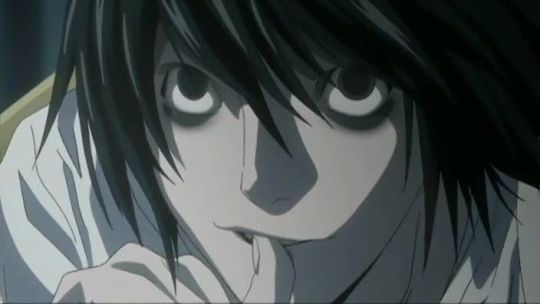
Now I love The Game Begins in English, but the Japanese goes for a very different message. In English, TGB paints L as a very detached, emotionless computer (fr the computer references always felt like a bit much…) and it mostly explains his approach to cases—all cases—and showcases his skill and enthusiasm for solving another puzzle.
The Japanese, on the other hand, comes out swinging as a psychoanalysis smack down of Kira’s ideology and way of thinking, at which point L personally vows to bring him down with the hook, ‘you’re an eyesore, so how about I play a game with you’. Notably, L sings this song directly to Kira, using the ‘you’ voice the entire time. It’s personal, emotional, condemning.
Empty your mind of any theories
Till all the facts are in
Here’s something new, intriguing series
Ripe secrets held within
The minor edits to the first verse give L more personality beyond ‘computer’. There’s the implied enjoyment of an intriguing case, and ripe secrets, which I feel falls more in line with who L is as a person. The lost lines, ‘start at the end of all your queries, to learn where things begin’ feels redundant enough to cut, plus I also never really understood the motif of working backwards in this song, except to justify the next lines which I left because they’re great.
You analyse by working backwards
Effects reveal their cause
For even perfect crimes have perfect flaws
A child’s rage is Kira’s calling
He calls it ‘justice’ still
I lie in wait, instead of stalling
To find the point of thrill
I poke and prod to find a weakness
Where the bend becomes the break
And make the most of Kira’s first mistake
Here we try to get more into L’s estimation of Kira. He spends much longer in the Japanese delivering better cut-downs which the original English lacks: ‘the ideal you are presenting is a cross of lies’, ‘you’re only lightly tracing the surface, conceitedly thinking you understand everything’. At least here in the edit he gets to call Kira a child, and deride his justice. This also is a nod to the deduction he makes, that Kira is a childish person.
Again, ‘point of thrill’ gestures towards L’s personality as someone who enjoys the puzzle, like a game, which is the point of the song.
I left the back half of the verse, because I enjoy it greatly. I think it is important to establish L as hypercompetent, and he is a little detached.
The game begins the same way
Our course is set, we’re in for all
Something about you moves me
But I know I’ll still see you fall
The game begins
The lost lines mostly reinforce the computer motif throughout the original, and just illustrate L’s method and determination.
The edit ‘in for all’ can reinforce the game symbolism, as well as the later ‘the die is cast’ line. Either way, this edit line goes to showing L’s determination as well.
The next line ‘something about you moves me’ showcases L’s more personal investment in this case, sort of accepting Kira as his rival and investing enough to risk his life for the first time on this case. This heightens the personal stakes, and builds up the relationship between L and Light.
Then the final line brings it back to L’s confidence, assurity, and skills.
He thinks he owns all information
He’s certain he’s ahead
Anticipate his adaptation
Untangle every thread
Some little thing, some minor detail
You’ve overlooked and then
I will be waiting here again
Again, the lost lines don’t do much other than use the computer motif and make L sound smart. Here the edit tries to get more character building for L, especially in contrast with Kira. At least here I get more derision in, but i just want to highlight the Japanese lyrics cause booiiii
‘While you’re flying the flag of your majestic ideals, you’re prancing about toying with people’s lives. You’ve long since abandoned any sense of fear, you poor fool, so let me show you a taste of Hell'
The game begins the same way
Our course is set, we’re in for all
Something about you moves me
But I know I’ll still see you fall
The game begins the same way
The chase is on the die is cast
Connecting bits of data
Until I chase you down at last!
Only note here, I choose ‘connecting bits of data’ instead of ‘I sift a thousand pixels’, simply because we’ve lost most of the computer references, so I thought the first sounded more natural without that support.
The game begins!
I think the edit strikes more of a balance between the English and Japanese, but perhaps I’ll make a more substantial edit to more closely translate the Japanese, because the Japanese lyrics are truly delightful. I still really like the English version, and there are some turns of phrase that I enjoy, but perhaps some other time I’ll kill more darlings.
Lmk what you thought, and stay tuned for more!
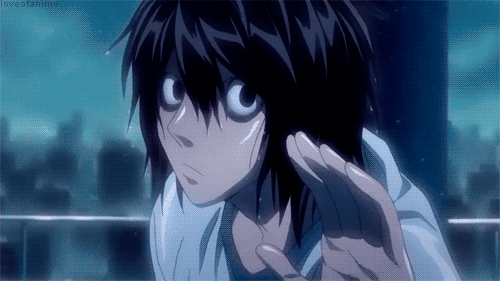
OG English Lyrics
Japanese Lyrics
Japanese Lyrics (Japan 2015 production)
15 notes
·
View notes
Text
Wicked's Existential Crisis
Deception is a big theme in Wicked. I don't think this is news to many people. The wizard is a wizard, truth is truth, happy is what happens when all your dreams come true.
Galinda embodies this pretty heavily, but so does Fiyero, although they do so in similar ways. They both lie to others, and realise that they have been lying to themselves later on.
But, you need a baseline before you get to character development. You need a benchmark for everyone to either move up or down from, depending on the genre.
In my opinion, Dancing Through Life establishes that benchmark, while asking a few more philosophical questions as it does.
Let me explain.
SPOILERS AHEAD
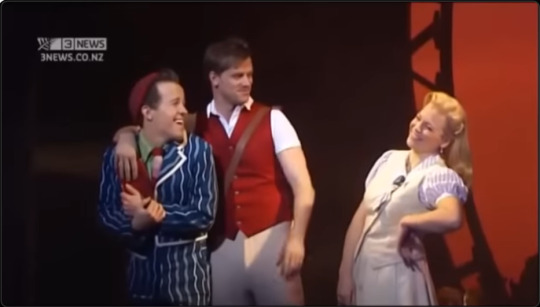
"Dancing through life,
Down at the Oz Dust
If only because dust
Is what we come to.
Nothing matters,
But knowing nothing matters,
It's just life
So keep dancing through"
Fiyero, buddy, friend, pal... are you ok?
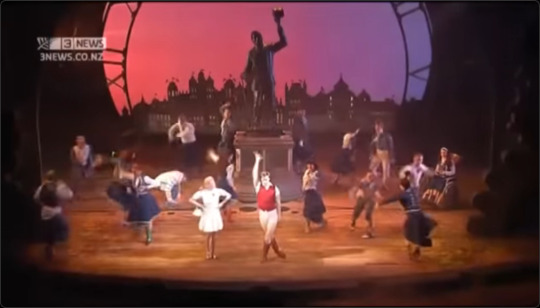
Dancing Through Life is the introduction of Fiyero, and there is a enormous difference between what he is saying and how he is saying it.
That dust line is actually a biblical allusion, with various Judeo-Christian books and prayers claiming that G-d created humans from dust, and that when someone dies, they return to that dust. Hence the "ashes to ashes, dust to dust" saying (source). So, Fiyero is nihilistic.
"Nothing matters, so why bother trying" is such a morbid idea, and its usually associated with emo music, either lots of drums and raw emotions, or quiet and sad. So, when Fiyero sings it as a musical theatre, bombastic full orchestra song, his message flies under the radar because it is so dissonant with the style.
That's the key here. Most of the time, people are nuanced, and stereotypes do not encompass the human experience at all. The emotionally confused or depressed or spiraling person isn't the one who sits in the moonlight writing sappy poetry, it's the person who manages to hide it the most easily because they've been doing it for the longest.
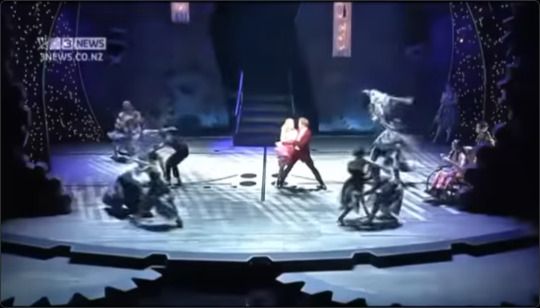
Fiyero is putting up a mask to hide his insecurities, and he is doing it by... not wearing a mask?
Lampshading is the practice of softening elements in a piece of media, letting the audience know that something is out of order or farcical, and turning it into a joke. Overly Sarcastic Productions (@comicaurora) has a video explaining the trope in detail.
In a weird way, this is what Fiyero is doing. He is turning his own crisis into a joke. He doesn't have to hide it if he can poke fun at it. He becomes self-referential, and tells people to move on past the words he is saying and focus on the fun dancing and music.
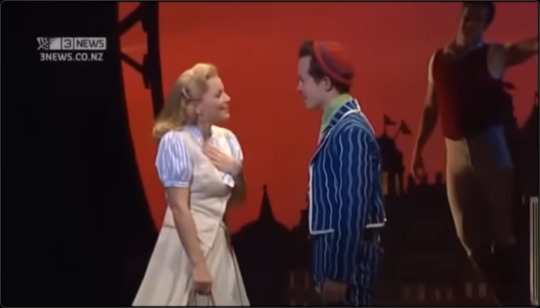
I see where Fiyero is coming from, here. Purpose is difficult to find in this world, and it definitely seems like neither good or bad are rewarded, and luck will do what it will. But I would like to present a counter point.
Everything Everywhere All At Once was easily the most emotionally powerful film of 2022, and it also discussed nihilism in detail. I don't want to get into plot spoilers, but this movie asks the question: If nothing matters, then what?
And the answer to this is clear: Everything. In a Cinema Therapy video on the film, Johnothan Decker states this:
"If nothing we do matters, then the only thing that matters is what we do."
Actions have whatever meaning we ascribe to them, and if we ascribe no meaning to anything, then everything has meaning on the same level. If nothing matters, then everything matters.
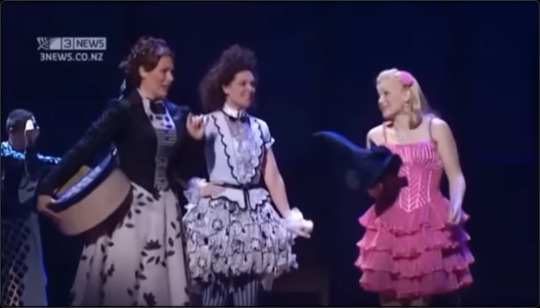
This segways into another core question of the musical and especially this song. Do intentions matter?
Galinda and Elphaba have a comedy of errors with the gift giving, specifically when Galinda sets up Nessa with Boq, and Elphaba arranges for her to receive a wand in return, contrasted with the infamous hat.
Galinda does things for personal gain, and accidentally makes someone's life slightly better for a moment, and Boq kind of does the same. Neither of the two cares about Nessarose, but they bring her happiness in the short term.
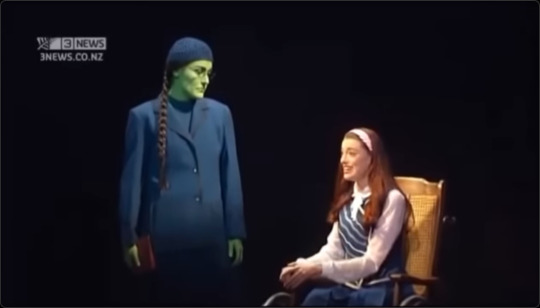
"We deserve each other, and Galinda helped it come true."
I mentioned in my post about The Wizard And I that this theme comes up there first, in association with meeting the wizard, and I think there is something else to it than just deception. Don't get me wrong, this is deception at work, Elphaba with the Wizard and Nessa with everyone around her. But that lie has a positive result here, for the moment.
It also separates the consequences from the intention. Elphaba sees the wizard and wants to improve the world, her hopes are on rocky foundations, but her actions are strong, and I have already mentioned what Galinda's actions do.

However, I would argue that intentions do matter, and that this musical agrees with me, and that is with Boq, a person whom I despise.
As a character, Boq is fascinating. He is a direct satire of the hopeless romantic of stereotypical fairy tales, think Ariel from The Little Mermaid, or Lancelot from the 1963 movie, Lancelot and Guenevere. Boq is trying desperately to court someone who does not care about him and has someone who does care fall from the sky in front of him, but he can't see past himself.
Now, pining is all well and good, you are allowed to pine, and if someone is attracted to you, there is no law that says you must be attracted back. But Boq goes a step further.
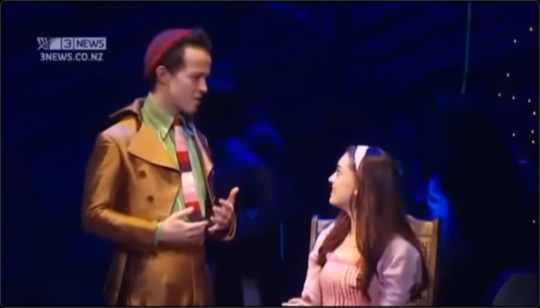
"It's because I'm in this chair
and you felt sorry for me.
Isn't that right?"
"No! No!
It's because you are so beautiful."
Boq had an opportunity to back out of the romance handed to him on a silver platter. He could have said it was just a dance, or even confessed that Galinda put him up to it, if he so desired. But Boq made a choice to keep stringing Nessarose along. He may have his reasons, but I think his actions are not excusable, and the gut punch at the end of the musical when he tells her that he never cared is a betrayal that could have been so easily avoided.
Boq and Fiyero go on to become key players in the "death" of the Wicked Witch of the West, and they do so for alternative reasons, and it reframes Dorothy's journey.
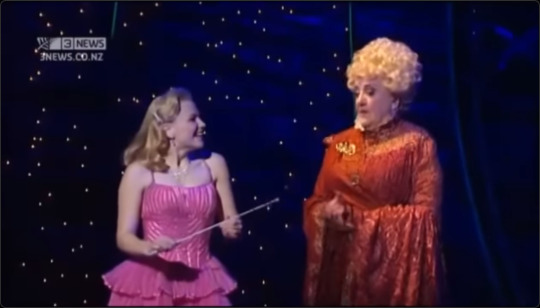
For a more nuanced explanation of what I mean, consider this: In 2019, youtuber Hbomberguy (Harry Brewis) raised $347000 for a Brittish charity organisation called Mermaids in a livestream of Donkey Kong 64, and he gave a speech in October of that year about why he did such a thing.
"I think secretly, we're always making one of two decisions, and we make that decision even if we don't know we're making it. You're either choosing to make life worse for someone you don't like, or better for people you care about.
There is an actual difference, and I didn't realise I made the wrong choice until a lot of people came over and helped change the choice retrospectively."
What you are trying to do matters, because if you keep trying to do good, even if you hit roadblocks, if you are truly committed, you will eventually do some good in the world.

I actually like Brewis' definition of right and wrong here, because it isn't overly philosophical, it pertains to individual actions. You either make someone else's life better or worse.
I have been rambling around my point for a while, so let me make it concise. Dancing Through Life asks philosophical questions about life. What matters? Is it you? Is it your actions? Is it your intentions?
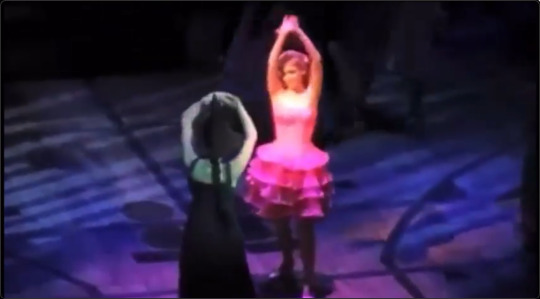
Final Thoughts
There are two other things I need to mention before I finish. First up, the extras are some of the best parts of this musical, and in this song, that is driven home. Everything comes across as so superficial, and not in a "that's bad acting" way, but in a "that's an actor playing a character who is acting" way. This carries over to Galinda's entire style of talking, but the extras knock it out of the park here. It means that the only sincere moments in the song hit with the relevant weight. Those being Elphaba and Nessa's conversation, and the Elphaba dance (something remarkably difficult to find images of).
That dance is the moment I see Glinda x Elphaba (I still refuse to use the Gelphie ship name) actually taking off, rather than in What Is This Feeling, because it's the first moment that the two see eye to eye, and Galinda finally understands Elphaba. She earns her friendship and trust by trying to make up for her mistakes. Galinda talks a lot, but actions speak louder than words, and that dance kicks off a love story.
Next week, I will be diving into Popular, a number that really takes apart the theming to an overt level only matched by one other song, and we will get to that one soon.
Previous - Next
#rants#literary analysis#literature analysis#character analysis#what's so special about...?#wicked#wicked the musical#elphaba thropp#galinda upland#wicked musical#gelphie#wicked is a queer story#fiyero#elphaba#glinda#long post
79 notes
·
View notes
Text


05.10.23
-> writing How Heinlein Writes Women: a Feminist Literary Criticism
-> Past my bedtime, probably. I'm skipping school tmrw to focus on ecs
-> have my mentioned before how much of a special interest i have in scifi?
-> use tabmerger!! genuinely the most productive site i've ever discovered for tab organization. plus it looks fuckin sick
#studyblr#studying#aesthetic#studyspo#literary analysis#criticism#feminism#robert a heinlein#science fiction#sci fi#literature#music#study#productivity#dark academia#100 days of productivity challenge#100 days of productivity
24 notes
·
View notes
Text
.
#OK TIME FOR A GOOD THING#my literary analysis class got into a whole argument today about hymns vs modern worship music and various takes thereon#and I brought up the psalms as a standard for how our worship music should go#and my professor started talking about the laments!!!#I appreciated that a lot!!#he said that there's really not a lot of lamenting in modern worship music and that he thinks there should be more#and I agree so much and really appreciated hearing someone older and wiser say it!! :D#also he said that spending time living abroad will really change your perspective on the world#and especially on worship culture#and make you start to realize how many of the hills we want to die on here in the U.S. (when it comes to church style and such)#are very much cultural and shouldn't be confused for genuine scripture issues#and I appreciated that as well!!
14 notes
·
View notes